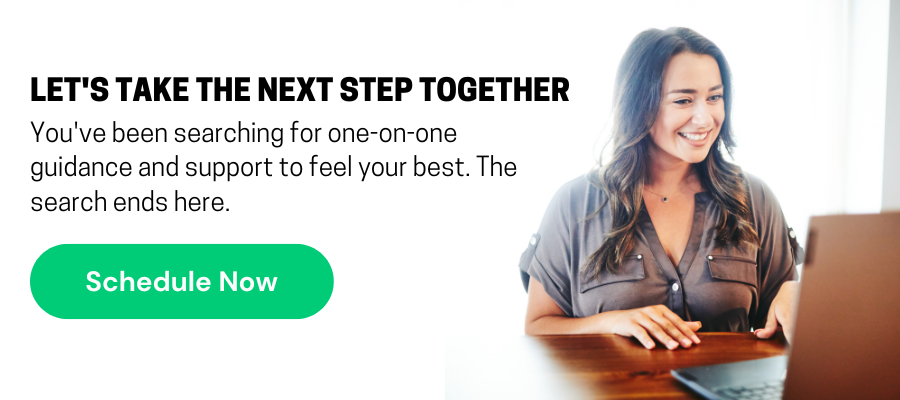
Whether you are currently logging your food, have logged your food in the past, or are considering starting to log your food--you have likely asked yourself this question:
Do I need to log my food forever?
You likely know that the process of food logging is helpful for many reasons.
Food logging helps you:
- Become more aware of what you are eating.
- Match your eating habits to your daily needs.
- Gain insight into your eating patterns.
However, it can become tedious and time-consuming, leading to the question of whether or not it is a forever thing.
As a registered dietitian who recommends food logging to many of my clients, I have had this discussion time and time again.
I have also helped people make the choices that are best for them individually so they can both achieve and maintain their goals in the long term.
Before we dive straight into forever, let’s consider now.
In this article, we’ll start by breaking down why food logging is important and how to make the most of it. We’ll also answer your burning question, will I have to do it forever?
Why Is Logging Food Important?
Logging your food can be one of the best tools for achieving your nutrition and health goals.
Many people struggle to remember what they ate for dinner last night, let alone recall everything they ate yesterday or last week. This lack of awareness can be responsible for poor eating choices, an imbalanced diet, and potential side effects like unintentional weight gain.
One of the biggest benefits of logging your food is an increase in awareness.
This includes taking note of:
- What you are eating
- When you are eating
- How much you are eating
This awareness can also build into something bigger than just what, when, and how much.
The increase in awareness can also help provide you with insight into why you are eating the things you do.
You may start to see patterns like when you skip lunch at work, you overeat at dinner or when you have a stressful day, you snack more in the afternoon or evening.
While we are concerned with what, when, and how much you are eating, oftentimes the why behind your choices can help facilitate some small changes that lead to big results.
Another important part of food logging is starting to match what you are putting into your body with what your body needs daily.
If you are following a calorie-counting system you may notice your typical intake is far over or under your daily calorie goal.
If you are following a food group system you may notice you’re eating more high-fat foods than you thought or not getting quite as many servings of veggies as you would like to.
If you aren’t aware of this misalignment in your eating patterns, you can’t adjust them. However, if you are logging your food and are aware of both your needs and your natural tendencies, you can alter your choices to achieve your goals.
The awareness and insight provided when you log your food can be transformational in your health journey.
How To Make The Most Of Food Logging?
Food logging can be a super successful endeavor, or it can quite honestly fall flat. We want you to find success so we are here with some tips for getting the most out of the time and energy you spend logging.
Be Thorough
While perfection isn’t the expectation, the more thorough you are with your food logging, the more benefit you will gain from it.
Logging all of your meals and snacks is the best way to get the clearest picture of what is happening and boost the awareness and insight we discussed above.
This means entering what you are eating and how much you are eating, as accurately as possible. It can also be helpful to keep track of when you are eating your meals and snacks for even more useful data.
Be Consistent
Time and time again we see clients who consistently log their meals Monday morning through Friday afternoon. Then the weekend hits, the routine slips, and the food log goes right out the window.
While the data we have from the first two-thirds of the week is great, it’s nowhere near the full picture of the week.
It’s also not a secret (or anything to be ashamed of) that many people eat differently on weekend days when compared to weekdays.
Skipping tracking these meals skews the information in your food log and makes things far more complicated.
Another common pattern many people fall into is not logging meals out at restaurants or social gatherings.
These meals may be harder to track because you’re not sure what they contain, and you may not get them exactly right.
However, it is far better to put in your best guess than just leave that meal blank.
Some data is better than no data.
Now, we are realists, and we know life doesn’t allow for 100% of the things that enter your mouth to enter your food log. However, especially when you are first starting and working toward your goals, consistency is key.
Log The Things You Don’t Want To
The ice cream you treated yourself to. The pizza for dinner on Friday night. The extra drink you had out with friends.
The choices you aren’t super proud of, and you don’t want to log. Log them!
Our brains do this weird thing where we act like if we don’t track it, it doesn’t count.
There is nothing wrong with eating things like this from time to time, and eliminating them from your food log won’t benefit you in the long run.
Again, being thorough and consistent, even with the things you don’t want to log is important to find success with food logging.
Work With A Dietitian
While logging your food on your own may seem like the accountability you need: working with a professional who can help you evaluate your intake and make the changes you need to achieve your goals can make the process much more efficient and effective.
Here at OnPoint Nutrition, we recommend the vast majority of our clients log their food in our app. We regularly review food logs with clients to help build awareness and gain insight, as discussed above.
We can also provide useful suggestions for how to adjust what, when, and how much you are eating to better align with your goals. Additionally, we dive into the why behind your choices in sessions so we can address the full picture of your eating and your habits, not just the data contained in your food log.
Don’t stress here though, there is no judgment for anything you log. We are real people who eat real food including pizza, french fries, and ice cream. No shame here!
As your nutrition coach, we also have access to additional data, which can help us identify patterns and trends over time.
For example, we can see your average intake of each food group over a week, a month, or the past six months. We can use this data, compared with your daily targets to identify if something is a pattern or a fluke.
Together, we use your log and our app analytics to ensure you are on the path to success.
The Long-Term Plan For Logging Food
We’ve made it to the burning question.
Now that you know why it’s important to log your food and how to make the most of it, it’s time to discuss the long-term plan for this method.
I like to think of food logging as transportation.
It’s like a train that takes you to a place that you want to go. The more thorough and consistent you are, the more quickly you will get there.
If you have a dietitian or nutritionist by your side, it’s like jumping on the express train.
Now, just because you take a train somewhere once, doesn’t mean you’ll never need to take a train again.
Sometimes you find yourself needing to get somewhere else.
Sometimes you find yourself back where you originally started and need to get to the same place again.
The trains are always there to take you where you need to go. Similarly, food logging is always there to help you achieve your goals.
But do I have to do it every day… for the rest of forever? The short answer is no.
Now we want to explain a little bit more about how to use food logging like a train to reach your goals, not a crutch you need forever.
When you are logging your food, you can take two paths:
- Path one is autopilot. It’s scanning a bunch of barcodes, letting an app calculate your calories, tell you if you’re “good” or “bad” and allowing it to do all the work for you. The autopilot path doesn’t lead to learning, and may not ever allow you to get off the train.
- Path two is mindfulness. It’s learning what your body needs daily, and how to balance your overall intake and your intake of each food group. It’s paying attention to your hunger and fullness cues and adjusting your intake based on what your body needs each day. The mindfulness path allows you to get off the train and still succeed.
The point of this example is that once you use food logging to learn all of these things and develop the skills and tools to use. You will no longer need to rely on an app to guide your choices, you can successfully stop logging your food without reverting to your old ways.
But always remember, the food logging train is there for you (when you need) to take you anywhere that you need to go.
Where To Next?
At this point, you know why logging your food benefits you and how to make the most of it.
You also know that you likely don’t have to do it forever, as long as you go about it the mindful way.
If you’re feeling like you need a little more support to take a mindful approach to food logging, we’ve got your back.
Here at OnPoint Nutrition, our team of dietitians and nutritionists use our very own app that focuses on portions and food groups to teach you how to fuel your body today, and every day, for the rest of your life.
Curious about our app? Read more about the technology we use to help you reach your goals.
Ready to dive into working with a nutrition coach? Schedule your free consultation today to get started with our team!
Topics

Liz has been reading nutrition labels since she learned how to read. Growing up with severe peanut and tree nut allergies she learned that it’s important to know what you are putting into your body. She made her first big lifestyle change as a freshman in high school, when she decided to become a vegetarian. However, it wasn’t until she took a food class in Italy as part of a study abroad program in college that it clicked in her mind that she wanted to make food and nutrition her career. Liz graduated from Penn State University in 2015 with a bachelor's degree in Nutrition, as well as a bachelor's degree in Marketing. She completed her dietetic internship with Aramark in Philadelphia, and her master's degree at Northeastern University shortly after.



